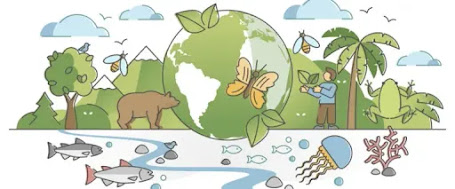WildFires
- Wildfires -
--------------------------------------------------------------------------------------------------------------------------------
How do they start?
 Wildfires are uncontrollable fires that burn on wild vegetation, grassland, the savanna, and other places. There are different types of wildfires such as surface and crown fires. Surfaces are fueled by smaller plants, twigs, shrubs, or leaves that have fallen onto the ground. Crown fires are at the tops of trees, those fires usually start off as surface fires and have climbed up. Wildfires can start for numerous reasons. The different types of fuel present in the area will drastically change the severity of the fire. If it has more dense objects (corse fuel) the fire will burn for a longer period of time and it's much hotter, the opposite is said if it has fine fuels like twigs it will burn quickly. If fuel objects are spaced around the fire has better access to spread quickly, unlike if all the fuel was tight packed, it wouldn't give the fire much space to move around or even worse suffocate the fire, extinguishing itself. Weather contributes to fires as well, if it's a hot-dry day it's a great time for fires to start. Windy weather allows fires to be spread more quickly, while rain of course hurts the fire's progress. You can't forget how the land actually is, a steeper slope is the best, and fires love to clime. Of course, fires will start with natural occurrences such as lightning or a spark.
Wildfires are uncontrollable fires that burn on wild vegetation, grassland, the savanna, and other places. There are different types of wildfires such as surface and crown fires. Surfaces are fueled by smaller plants, twigs, shrubs, or leaves that have fallen onto the ground. Crown fires are at the tops of trees, those fires usually start off as surface fires and have climbed up. Wildfires can start for numerous reasons. The different types of fuel present in the area will drastically change the severity of the fire. If it has more dense objects (corse fuel) the fire will burn for a longer period of time and it's much hotter, the opposite is said if it has fine fuels like twigs it will burn quickly. If fuel objects are spaced around the fire has better access to spread quickly, unlike if all the fuel was tight packed, it wouldn't give the fire much space to move around or even worse suffocate the fire, extinguishing itself. Weather contributes to fires as well, if it's a hot-dry day it's a great time for fires to start. Windy weather allows fires to be spread more quickly, while rain of course hurts the fire's progress. You can't forget how the land actually is, a steeper slope is the best, and fires love to clime. Of course, fires will start with natural occurrences such as lightning or a spark.
How do they affect you?
Wildfires affect everything on earth they can affect us in positive and negative ways. Starting off with the negatives they are bad for you, they release CO2, CO, and finer matter in the air resulting in health problems, such as trouble breathing, lung cancer, death, and heart problems. Depending on the severity they can damage homes, stores, and streets which causes lots of harm and stress to those who have lost something to the wildfires. they can kill people, which is bad. They ruin ecosystems by ruining the homes of the animals forcing them to leave and try to survive, which in the end most die, in turn lowering our biodiversity, in turn creating more problems in the environment. Depending on the size we could take months of trying to contain the wildfire wasting resources like water, It produces more CO2 which in turn contributes to worse climate change. On the positive not ecosystems love fires, they get rid of dead leaves, twigs, invasive species, etc. Also, many plants need teh hotness from fires to reproduce, it also retires nutrients to the soil, not to mention it opens up the space allowing for younger trees or plants to thrive better.
--------------------------------------------------------------------------------------------------------------------------------
Preventions?
Controlled fires are one of the best practices we can do, they allow for forests to get rid of all teh yucky things and lower the potential of wildfires even starting. To not unintentionally start a fire always check weather conditions, don't put a campfire near burnable things, don't drive on dry land, and more.
--------------------------------------------------------------------------------------------------------------------------------
Work Cited
“Controlled Burning.” Education, education.nationalgeographic.org/resource/controlled-burning/. Accessed 13 June 2023.
“Wildfire Climate Connection.” National Oceanic and Atmospheric Administration, www.noaa.gov/noaa-wildfire/wildfire-climate-connection. Accessed 13 June 2023.
“Wildfires and Climate Change.” Center for Climate and Energy Solutions, 18 May 2022, www.c2es.org/content/wildfires-and-climate-change/.
“Wildfires.” Education, education.nationalgeographic.org/resource/wildfires/. Accessed 13 June 2023.
“Wildfires.” Environmental Defense Fund, www.edf.org/climate/heres-how-climate-change-affects-wildfires. Accessed 13 June 2023.
“Wildfires.” World Health Organization, www.who.int/health-topics/wildfires#tab=tab_1. Accessed 13 June 2023.





Comments
Post a Comment